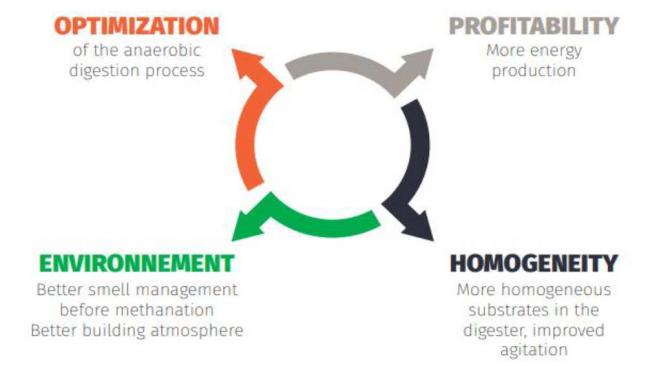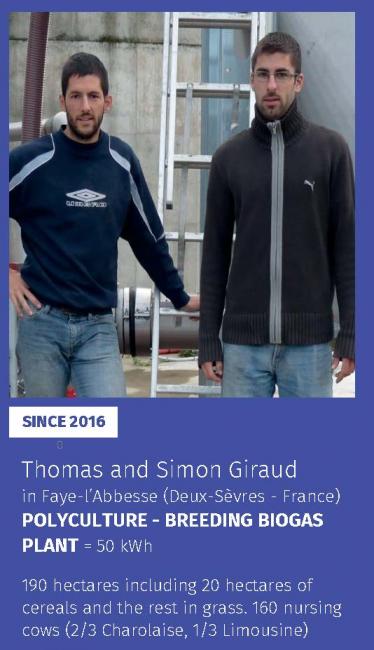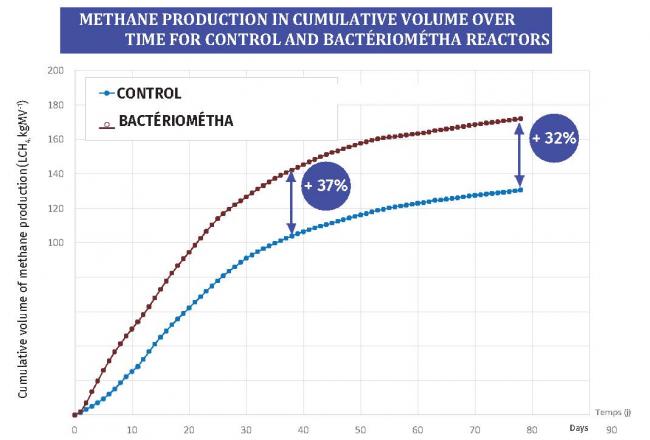
SOBAC
METHANATION : HOW DOES IT WORK ?
Product/Usage
- Bactériometha (since 2016) / To increase energy production<
Testimonial
METHANATION : HOW DOES IT WORK ?

BACTÉRIOMÉTHA is a complex of microorganisms composed of a flora selected for its properties adapted to the process of anaerobic digestion. The effects of BACTÉRIOMÉTHA are :
An increase in energy production thanks to :
- a better attack of the fibres in the digester,
- the seeding of microorganisms involved in the various processes of anaerobic digestion thus promoting the chain of enzymatic reactions and therefore the production of biogas.
- A significant reduction in smells before methanation by blocking nitrogen and carbon in the manure under the animals and during storage.
- An overall improvement in the digestion process and consistency in the digester and agitation.
AN INCREASE IN BIOGAS PRODUCTION :

Pioneers in their region, Thomas and Simon Giraud switched to methanisation (anaerobic digestion) six years ago. With BACTÉRIOMETHA, they improved the atmosphere in the stables, increased the production of biogas and therefore the electrical income.
« We discovered biogas production in an agricultural journal in 2009. There was a call for projects from our region for small installations of 50 kW. We answered. Our installation was launched in 2010 and entered production in 2013. In addition to the electricity sold, it produces heat for calves and for fi ve homes. We have a 15 years contract. Ecologically, we emit much less CO2 into the air, around 210 tonnes. And in electricity, our daily production is around 1,200 kW. Over the year we produce the equivalent of the consumption of 70 homes. We have also set up a fodder dryer. Autonomy and environment work together.
In fact, we wanted to make better use of our livestock effluents.
The digestate is better valued by the plant. In the end, we produce electricity, we gain in fertilization and we go in the direction of animal wellbeing since we clean up stalls more often. It was François Bacle who approached us. He proposed BACTÉRIOMÉTHA to us which must be incorporated in the litters like BACTÉRIOLIT. BACTÉRIOMÉTHA accelerates the decomposition of manure in the digester, homogenizes the whole and allows more effi cient mixing. Its use also allows a signifi cant reduction in odours before anaerobic digestion thanks to the blocking of carbon and nitrogen in the substrates under animals and in storage. There is an increase in the production of biogas which has been measured following the contribution of BACTÉRIOMÉTHA within the framework of a study. ».
+ 37 % PRODUCTION AT 40 DAYS :
The results presented in the graph below support the results observed on a large scale at EARL GIRAUD. They come from an experiment carried out on a control group of cattle manure compared to the same cattle manure seeded with BACTÉRIOMÉTHA at 1 kg/m3 of manure. Manure production was carried out in the same building, on two identical boxes, with the same number of animals separated by a corridor and a feeding area.
The positioning of BACTÉRIOMÉTHA was done in one of the batches, 1/3 on fresh straw and the remaining 2/3 15 days before mucking out. Manure samples were taken and sent to INRA Transfert in Narbonne, France to analyse and monitor the anaerobic digestion of these manures in a pilot anaerobic digestion reactor. The graph below shows the evolution of biogas production from 0 to 80 days of digestion.

CONCLUSION :
This difference in production can be explained by several phenomena, including :
- The action of BACTÉRIOMÉTHA positioned under animals which prepares manure and makes organic matter more accessible during the anaerobic digestion process.
- The establishment with BACTÉRIOMÉTHA of microorganisms involved in anaerobic digestion processes. This flora accelerates and improves the anaerobic digestion process and thus produces more biogas, in faster and in greater quantity.

